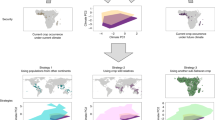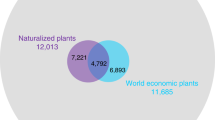Abstract
THE majority of the cultivated plants of the eastern and western hemispheres are represented by totally different genera, and until comparatively modern times very few such plants were common to both hemispheres. Many of the cereal and legume crops cultivated in the Old World before the time of Columbus were quite unknown in America, and the reverse was equally true. The subsequent introduction of rubber into the Far East from the Amazon region, via Kew, is the classic example of plant introduction ; but of equal importance we may note that of sugar cane from the East into the West Indies, potatoes from South America into Europe, cinchona from South America into the East Indies, groundnuts from Brazil into Africa and India, and in more recent years, soybeans from Manchuria into America and parts of Europe.
This is a preview of subscription content, access via your institution
Access options
Subscribe to this journal
Receive 51 print issues and online access
$199.00 per year
only $3.90 per issue
Buy this article
- Purchase on Springer Link
- Instant access to full article PDF
Prices may be subject to local taxes which are calculated during checkout
Similar content being viewed by others
References
Nuttonson, M. Y., International Agro-Climatological Series, American Institute of Crop Ecology, Washington.
Thornthwaite, C. W., Geog. Rev., 38, 55 (1948).
Author information
Authors and Affiliations
Rights and permissions
About this article
Cite this article
HOWE, G. Agro-Climatic Analogues. Nature 161, 983–984 (1948). https://doi.org/10.1038/161983a0
Issue Date:
DOI: https://doi.org/10.1038/161983a0
This article is cited by
-
Analysis and Predictability of Drought In Northwest Africa Using Optical and Microwave Satellite Remote Sensing Products
Scientific Reports (2019)
-
Ecology of the grassland. II
The Botanical Review (1950)
Comments
By submitting a comment you agree to abide by our Terms and Community Guidelines. If you find something abusive or that does not comply with our terms or guidelines please flag it as inappropriate.



